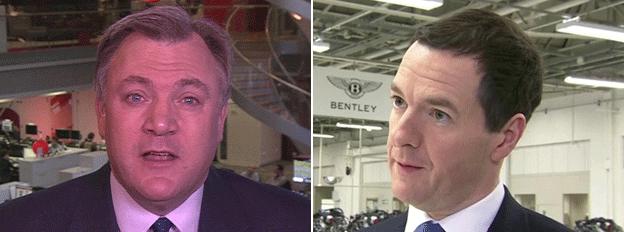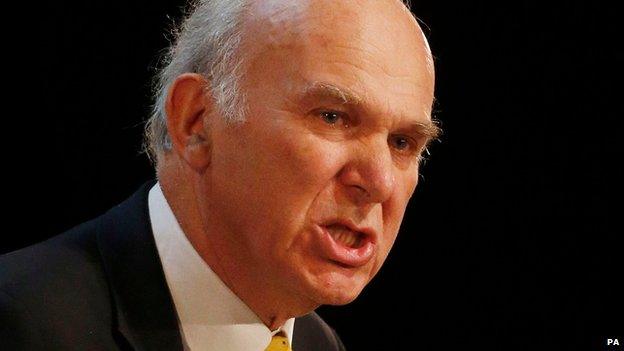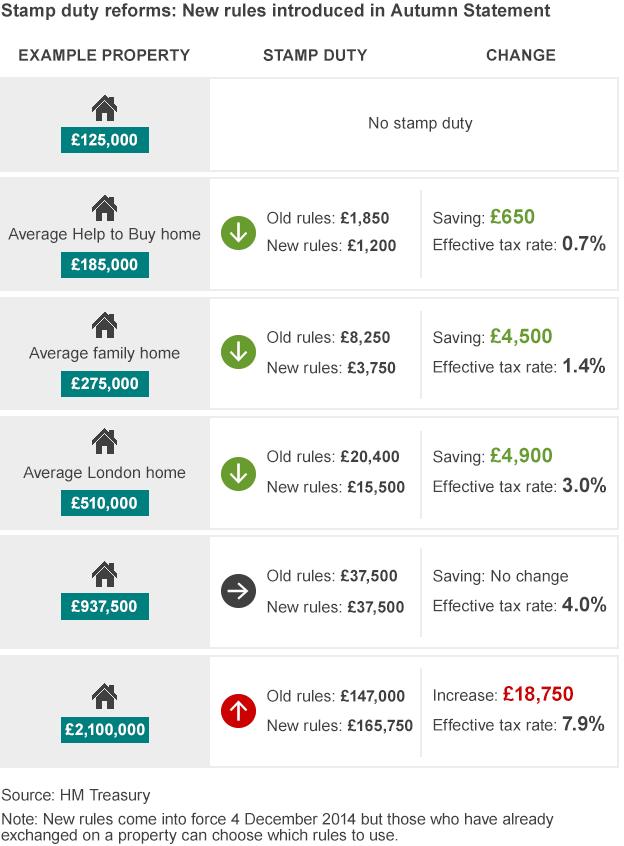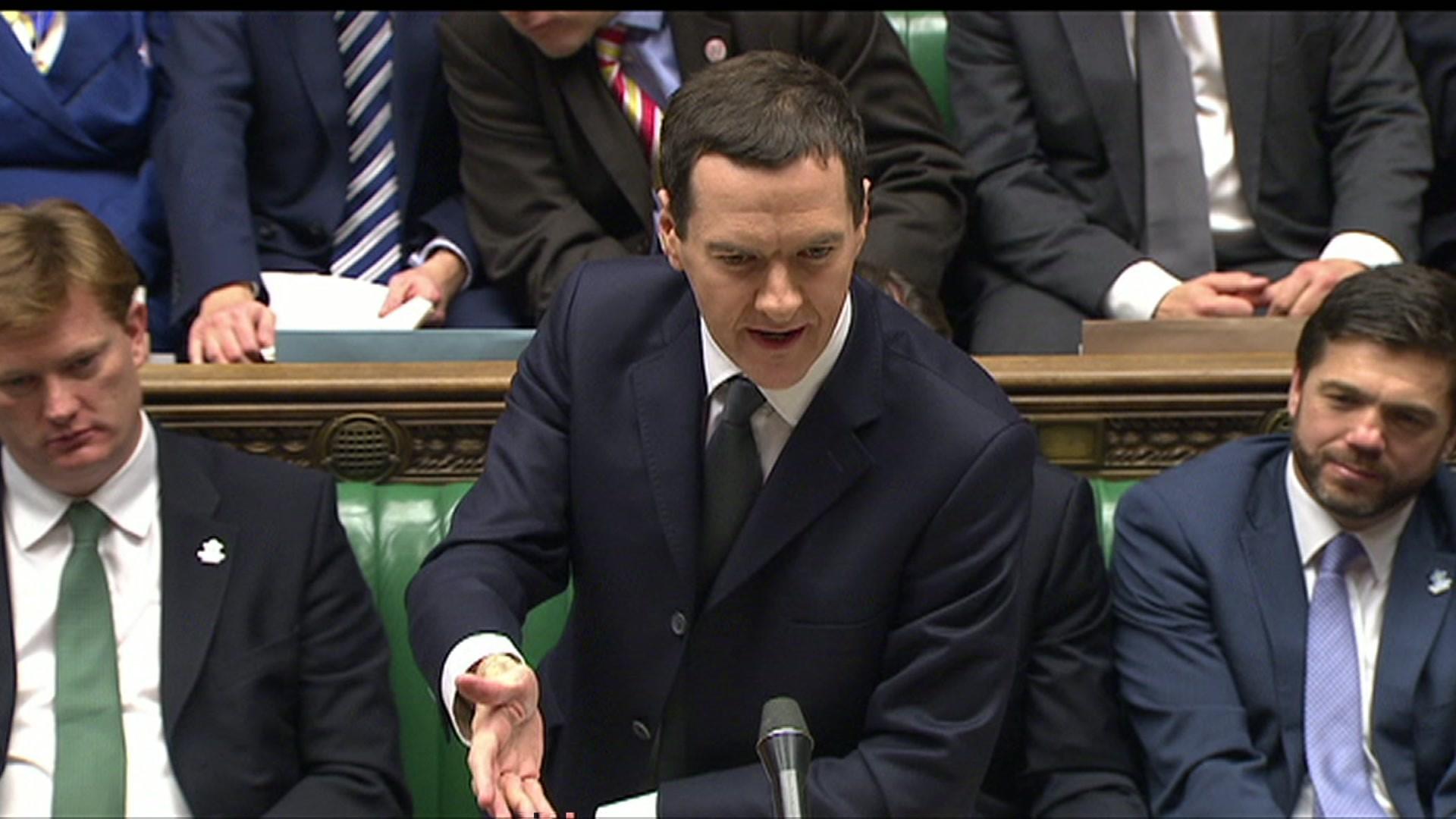Osborne: Autumn Statement cuts warnings 'hyperbolic'
- Published

Ed Balls, left, and George Osborne have been doing post-Autumn Statement media rounds
George Osborne has dismissed "totally hyperbolic" coverage of future spending cuts following his Autumn Statement.
The chancellor said arguments made against cuts in 2010 had been wrong.
Forecasters predict public spending will fall to levels not seen since the 1930s, suggesting the loss of one million public sector jobs by 2020.
The statement revealed borrowing would be higher than forecast and unveiled an £800m stamp duty cut Mr Osborne said would benefit 98% of homebuyers.
Labour has said the government's deficit reduction targets were "all in tatters".
George Osborne described some BBC coverage on spending cuts as "nonsense"
And Lib Dem Business Secretary Vince Cable accused the Conservatives of wanting to reduce the deficit "brutally", saying his coalition partners' plans were "simply not realisable".
The Institute for Fiscal Studies' Paul Johnson said the cuts would be "on a colossal scale", would mean a "fundamental reimagining of the role of the state" adding that it would be wrong to describe them as "unachievable".
The three largest Westminster parties have been accused of being unclear about how they would reduce borrowing by closing the gap between tax revenues and spending in the next Parliament.
Asked about spending cuts to come in the next parliament, Mr Osborne told BBC Radio 4's Today programme: "I would have thought the BBC had learnt from the last four years that its totally hyperbolic coverage of spending cuts has not been matched by what's actually happened in our country."
He added: "I had all that when you were interviewing me four years ago and has the world fallen in? No it hasn't."

He acknowledged that "the job is not finished" and blamed "all sorts of economic storms" for the failure to clear the UK's budget deficit as promised.
Future cuts would include freezing working-age benefits for two years and lowering the benefit cap for working-age households, he added.
BBC political editor Nick Robinson said Mr Osborne was "cross because he thinks it's a case of back to the future" with arguments used before the 2010 election being repeated.
The Conservatives are hoping people turn to them if they are worried about government borrowing, while Labour want to "redefine the problem" to link it to living standards, he added.
A BBC spokeswoman said: "We're satisfied our coverage and analysis has been fair and balanced and we gave the chancellor plenty of opportunity to respond on the programme. We will continue to ask ministers the questions our audience want answered."
The Office for Budget Responsibility (OBR), in its report , externalaccompanying the chancellor's statement, said public spending would fall from £5,650 per head in 2009-10 to £3,880 in 2019-20.
Ed Balls MP: "Every target missed, every test failed, every promise broken"
Day-to-day public services spending as a share of GDP would be at a level not seen since the late 1930s, it added.
Described by OBR chairman Robert Chote as a "very sharp squeeze", some 60% of the total spending reduction between 2010 and 2020 is forecast to come in the next parliament.
'Fantasy tax cuts'
Conservative MP Nick Herbert, a former Home Office minister, told BBC Radio 4's World at One the spending cuts presented an opportunity for government to find "smarter" ways to deliver public services, emphasising the digital opportunities available.
Pressed on the scale of spending cuts in the next Parliament, Mr Herbert said some of the "1930s language" being used was "a little provocative", as it implied a return to the Depression and the mass unemployment associated with that era.
He said public spending as a share of GDP was down to near 37% when the Conservatives left office in 1997 - the same, he said, as Australia spends now.
The Arundel and South Downs MP maintained that it was possible to run a decent public sector and welfare system and spend responsibly.
Mr Osborne accepted on Wednesday that the budget deficit - due to be more than £90bn this year - was not closing as fast as he had hoped.
But he said it had been halved since 2010 and was still predicted to fall.
Shadow chancellor Ed Balls criticised what he called "fantasy tax cuts" in the Autumn Statement.
He said his party would support the stamp duty reforms while pressing ahead with its plans for a "mansion tax" on homes valued over £2m.
Speaking on BBC Radio 4's Today programme, he said Labour would clear the deficit in the next parliament but would make "different and fairer choices" to the Conservatives.

Vince Cable: The Conservatives want to cut spending "rather more brutally than we think is necessary"
CBI director general John Cridland said the government would have to be "much more imaginative" about how it makes further spending cuts.
"Most of what we've done in this parliament, frankly, has been efficiency savings, cuts in head count, controls on pay," he told BBC Radio 4's Today programme.
"If you're going to make the cuts we now need to make you've got to be far more lateral, you've got to re-engineer the whole model."
One "way forward" could be a reduction in the number of government departments, he suggested.
Chief Secretary to the Treasury Danny Alexander defended the government's record after Labour accusations its budget promises were "in tatters".
The Lib Dem cabinet minister said the coalition had been right not to stick to its targets after economic problems in the eurozone had affected the UK.
"The impact of the financial crisis on our own domestic economy also was greater than we expected," he said.
"And I think we made the right call, which was to say we've set out a plan and we're going to stick to it, but we're not going to chase our tails on the numbers every time the forecast changes."
His party leader Nick Clegg was not in the Commons to hear the statement, but said he co-authored it and was "proud" of its contents.
But Mr Osborne criticised his coalition partners, telling Sky News the Lib Dems sign up to government policy in private, then "slag them off" in public.
George Osborne says the stamp duty in changes his Autumn Statement will benefit 98% of homebuyers
The Autumn Statement - called the pre-Budget report under the last Labour government - is a chance to set out future tax and spending plans as well as set out the state of the nation's finances.
MPs were told on Wednesday that growth was set to be 3% this year, higher than Germany, but falling to 2.3% by 2019.

The headline-grabbing announcement on stamp duty means no tax will now be paid on the first £125,000 of a property.
Above that level, the levy will go up in proportion to the sale price.
The Treasury said someone buying a property at the average family home price of £275,000 would save £4,500, while a £2.1m purchase would carry £18,750 more stamp duty compared with the old system.

The OBR chairman, Mr Chote, said the reform could put up house prices in some areas, predicting they would rise where the tax had fallen, and fall where it had risen.
The tax cut is UK-wide until April when stamp duty is devolved to Scotland.
But Mark Littlewood, from the free-market Institute of Economic Affairs think tank, said most of Mr Osborne's announcements were "fiddling at the edges" and that deep cuts should follow.
"My guess is that the chancellor is hoping that a 'steady as she goes' message will be enough to get him re-re-elected and back in Number 11 after the next election.
"But if that does happen he's going to have to take some much more radical action than he has promised [on Wednesday]."

- Published3 December 2014
